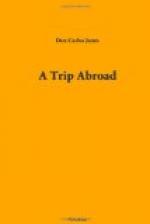The climate depends more upon local conditions than on the latitude, which is the same as Southern Georgia and Alabama, Jerusalem being on the parallel of Savannah. In point of temperature it is about the same as these localities, but in other respects it differs much. The year has two seasons—the dry, lasting from the first of April to the first of November, and the rainy season, lasting the other five months, during which time there are copious rains. One authority says: “Were the old cisterns cleaned and mended, and the beautiful tanks and aqueducts repaired, the ordinary fall of rain would be quite sufficient for the wants of the inhabitants and for irrigation.” The summers are hot, the winters mild. Snow sometimes falls, but does not last long, and ice is seldom formed.
Palestine is not a timbered country. The commonest oak is a low, scrubby bush. The “cedars of Lebanon” have almost disappeared. The carob tree, white poplar, a thorn bush, and the oleander are found in some localities. The principal fruit-bearing trees are the fig, olive, date palm, pomegranate, orange, and lemon. Grapes, apples, apricots, quinces, and other fruits also grow here. Wheat, barley, and a kind of corn are raised, also tomatoes, cucumbers, watermelons, and tobacco. The ground is poorly cultivated with inferior tools, and the grain is tramped out with cattle, as in the long ago.
Sheep and goats are the most numerous domestic animals, a peculiarity of the sheep being the extra large “fat tail” (Lev. 3:9), a lump of pure fat from ten to fifteen inches long and from three to five inches thick. Cattle, camels, horses, mules, asses, dogs and chickens are kept.
CHAPTER IX.
HISTORIC SKETCH OF PALESTINE.




